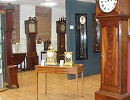Contact Seller
Carlton Clocks
Tel01935 713333Please quote Antiques Atlas.


 Quality Victorian French 19th century mantle clock
Quality Victorian French 19th century mantle clock
 Pretty antique Staffordshire mantle clock
Pretty antique Staffordshire mantle clock
 Mappin & Webb Kieninger Glass Mantel Clock
Mappin & Webb Kieninger Glass Mantel Clock
 Aesthetic Style Olive Wood Mantel Clock
Aesthetic Style Olive Wood Mantel Clock
 Satinwood Mantle Timepiece
Satinwood Mantle Timepiece
 Antique Staffordshire mantle clock
Antique Staffordshire mantle clock
 Antique Mahogany Inlaid Chiming 8 Day Mantle Clock
Antique Mahogany Inlaid Chiming 8 Day Mantle Clock
 1858 French Slate Striking Mantel Clock by Japy
1858 French Slate Striking Mantel Clock by Japy
 Four Glass Mantle Clock, Circa 1900
Four Glass Mantle Clock, Circa 1900
 Regency Mantel Clock
Regency Mantel Clock
 Leroy and Fils French mantle clock circa 1818
Leroy and Fils French mantle clock circa 1818
 Jaeger LeCoultre Atmos ll Dating 1950-1960
Jaeger LeCoultre Atmos ll Dating 1950-1960
Non UK callers :
+44 1935 713333
Rare Astronomical Clock, showing High Tide at Lond


A most rare tidal antique clock devised by James Ferguson (1710-1776), a driven astronomer and one of the most highly regarded and successful popularisers of natural science in the 18th century. The mechanics are described and illustrated in Ferguson’s 1773 compendium Select Mechanical Exercises: Shewing how to construct different Clocks, Orreries and Sundials. where he notes it requires “…only two Wheels and a Pinion added to the common Movement”. The detail is now available to read online in Encyclopaedia Londinensis for 1811 – see page 332 at this link -
This clock is unsigned and dates from the third quarter of the 19th century, but adopts Ferguson’s principles.
Movement
The 8-day timepiece fusee movement has four turned and ringed pillars, and in addition to the usual timepiece gearing structure, has an extra wheel for the moon’s aging (see note 1).
Dial
The main dial plate shows a 24-hour sequence showing I to XII twice.
Effectively, the hands for this clock are rotating disks of the same size
- the forward disk has a slot and a hand decorated as a moon This disk is decorated with markings for time of HIGH TIDE AT LONDON BRIDGE, TIME OF HER SOUTHING, an additional aperture for the moon's age, a blue painted ellipse with markings for high and low water, and two wires within an aperture to indicate the time of high water and the age of the moon.
- the second disk sits behind the first and has a hand decorated as a sun. The sun decorated hand indicates the time of day, as shown on the 24-hour dial behind.
Visible through the slot and painted onto the inner disk is the moon phase in days from 1 to 29½, and the Time of High Water I to XII twice (subdivided into quarter hours). One wire is directly in line with the moon hand which extends beyond the disk. This shows the time of the moon's southing,or the time at which the moon passes the meridian.
In London there is a two and a half hour gap between these two times.
As the sun goes round the dial plate in 24 hours, and the moon in 24 hours, 50½ minutes, the moon makes 28.5 revolutions whilst the sun makes 29.5 revolutions.
There is a further circular aperture showing the age of the moon age graphically.
These functions are created by having two equal diameter wheels, one with 57 teeth, and the other with 59, both being driven by the same 19 tooth pinion. This pinion rotates three times in 24 hours.
Note 1:
There is a systemic inaccuracy inherent in the gearing of the antique clock. The sun hand (for time) is affixed to the wheel of 57 teeth. The moon hand is fixed to the wheel of 59 teeth. The pinion itself turns once in 8 hours, or three times in 24 hours. Therefore the 59 tooth wheel goes around in (8 x 59)/19=24.842105 Hours.
This equates to 24hrs 50.5263mins which is in excess of that required by 0.0263mins/day, or 16 hours per 100 years.
According to tide / moon antique tables, the reading given today is out by about 25½ hours this cumulative error suggests (very crudely) that the clock dates from c.1860.
This is a really interesting horological item. If you want to calculate the time of high tide at London Bridge to negotiate your tall ship through the bridge, this is NOT the one for you. But it has a great deal of charm and character.
The clock is currently undergoing overhaul through our workshops, and is photographed here prior to restoration.
We are proud to be one of the UK’s finest suppliers of high quality Antique Clocks. We are based in Somerset, but also serve the rest of the UK. We are also delighted to have a number of overseas customers.
The workshops have recently relocated to Somerset and we continue to stock a large range of antique clocks and new clocks at very competitive prices.
We are proud to be members of LAPADA, the Association of Art and Antique Dealers.
Carlton Clocks is also a business partner of the British Horological Institute.
Ian has years of experience in restoring and maintaining clocks. He has a particular interest in early electric clocks. You will see from our Electric Clocks catalogue that we also manufacture and supply a small range of parts for Bulle, Eureka and Brillie electric clocks.
The mix of other clocks for sale is limited only by what Ian finds interesting and/or beautiful, aesthetically or mechanically.
SellerCarlton Clocks
View all stock from
Carlton Clocks

 Bank Farm
Bank Farm
Lower Odcombe
Yeovil
Somerset
BA22 8TY
Tel : 01935 713333
Non UK callers : +44 1935 713333
Get directions to Carlton Clocks
This clock is unsigned and dates from the third quarter of the 19th century, but adopts Ferguson’s principles.
Movement
The 8-day timepiece fusee movement has four turned and ringed pillars, and in addition to the usual timepiece gearing structure, has an extra wheel for the moon’s aging (see note 1).
Dial
The main dial plate shows a 24-hour sequence showing I to XII twice.
Effectively, the hands for this clock are rotating disks of the same size
- the forward disk has a slot and a hand decorated as a moon This disk is decorated with markings for time of HIGH TIDE AT LONDON BRIDGE, TIME OF HER SOUTHING, an additional aperture for the moon's age, a blue painted ellipse with markings for high and low water, and two wires within an aperture to indicate the time of high water and the age of the moon.
- the second disk sits behind the first and has a hand decorated as a sun. The sun decorated hand indicates the time of day, as shown on the 24-hour dial behind.
Visible through the slot and painted onto the inner disk is the moon phase in days from 1 to 29½, and the Time of High Water I to XII twice (subdivided into quarter hours). One wire is directly in line with the moon hand which extends beyond the disk. This shows the time of the moon's southing,or the time at which the moon passes the meridian.
In London there is a two and a half hour gap between these two times.
As the sun goes round the dial plate in 24 hours, and the moon in 24 hours, 50½ minutes, the moon makes 28.5 revolutions whilst the sun makes 29.5 revolutions.
There is a further circular aperture showing the age of the moon age graphically.
These functions are created by having two equal diameter wheels, one with 57 teeth, and the other with 59, both being driven by the same 19 tooth pinion. This pinion rotates three times in 24 hours.
Note 1:
There is a systemic inaccuracy inherent in the gearing of the antique clock. The sun hand (for time) is affixed to the wheel of 57 teeth. The moon hand is fixed to the wheel of 59 teeth. The pinion itself turns once in 8 hours, or three times in 24 hours. Therefore the 59 tooth wheel goes around in (8 x 59)/19=24.842105 Hours.
This equates to 24hrs 50.5263mins which is in excess of that required by 0.0263mins/day, or 16 hours per 100 years.
According to tide / moon antique tables, the reading given today is out by about 25½ hours this cumulative error suggests (very crudely) that the clock dates from c.1860.
This is a really interesting horological item. If you want to calculate the time of high tide at London Bridge to negotiate your tall ship through the bridge, this is NOT the one for you. But it has a great deal of charm and character.
The clock is currently undergoing overhaul through our workshops, and is photographed here prior to restoration.
We are proud to be one of the UK’s finest suppliers of high quality Antique Clocks. We are based in Somerset, but also serve the rest of the UK. We are also delighted to have a number of overseas customers.
The workshops have recently relocated to Somerset and we continue to stock a large range of antique clocks and new clocks at very competitive prices.
We are proud to be members of LAPADA, the Association of Art and Antique Dealers.
Carlton Clocks is also a business partner of the British Horological Institute.
Ian has years of experience in restoring and maintaining clocks. He has a particular interest in early electric clocks. You will see from our Electric Clocks catalogue that we also manufacture and supply a small range of parts for Bulle, Eureka and Brillie electric clocks.
The mix of other clocks for sale is limited only by what Ian finds interesting and/or beautiful, aesthetically or mechanically.
Price The price has been listed in British Pounds.
Conversion rates as of 14/NOV/2024. Euro & Dollar prices will vary and should only be used as a guide.
Always confirm final price with dealer. to include delivery in the mainland UK
Category Antique Clocks
Period Early Victorian Antiques
Material Mahogany
Origin English
Item code as392a345 / HS LB
Status Sold
£9800.00 
$12453.84 
€11775.68 

$

€

Conversion rates as of 14/NOV/2024. Euro & Dollar prices will vary and should only be used as a guide.
Always confirm final price with dealer. to include delivery in the mainland UK
Shipping information
We deliver our clocks fully insured free of charge anywhere in the United Kingdom and include comprehensive setting up instructions. Quotations can be arranged anywhere else worldwide.
View all stock from
Carlton Clocks

 Bank Farm
Bank FarmLower Odcombe
Yeovil
Somerset
BA22 8TY
Tel : 01935 713333
Non UK callers : +44 1935 713333
Get directions to Carlton Clocks
You may also be interested in
 Quality Victorian French 19th century mantle clock
Quality Victorian French 19th century mantle clock
 Pretty antique Staffordshire mantle clock
Pretty antique Staffordshire mantle clock
 Mappin & Webb Kieninger Glass Mantel Clock
Mappin & Webb Kieninger Glass Mantel Clock
 Aesthetic Style Olive Wood Mantel Clock
Aesthetic Style Olive Wood Mantel Clock
 Satinwood Mantle Timepiece
Satinwood Mantle Timepiece
 Antique Staffordshire mantle clock
Antique Staffordshire mantle clock
 Antique Mahogany Inlaid Chiming 8 Day Mantle Clock
Antique Mahogany Inlaid Chiming 8 Day Mantle Clock
 1858 French Slate Striking Mantel Clock by Japy
1858 French Slate Striking Mantel Clock by Japy
 Four Glass Mantle Clock, Circa 1900
Four Glass Mantle Clock, Circa 1900
 Regency Mantel Clock
Regency Mantel Clock
 Leroy and Fils French mantle clock circa 1818
Leroy and Fils French mantle clock circa 1818
 Jaeger LeCoultre Atmos ll Dating 1950-1960
Jaeger LeCoultre Atmos ll Dating 1950-1960






